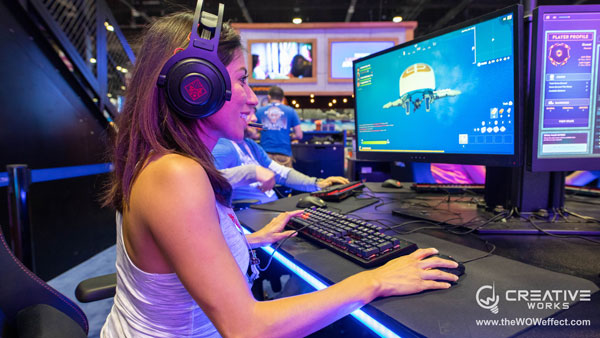BLOG
Esports vs Arcade VR Tournaments – Understand the Differences

Right now, Esports is one of the hottest buzzwords, not only in gaming, but in the entertainment industry as a whole. The Esports craze has hit around the globe, and it’s continuing to pick up steam.
A lot of entertainment operators are trying to get a slice of the valuable $138 billion Esports industry pie, and for good reason. This massive growth has come in the last few years alone, and the numbers are expected to continue to skyrocket over the next few years.
However, with the fast growth and expansion of Esports, sometimes the line of what is considered true Esports can be blurry and difficult to distinguish. “Esports” is often thrown around as a catch-all buzzword to describe tournament features and leaderboards. Just because a game or attraction has the ability to host tournaments, it doesn’t necessarily mean it falls under the Esports umbrella.
In this blog, we’re going to break down what exactly Esports is and how it differs from arcade and virtual reality tournaments. This will give you a better understanding of what makes Esports so popular and why it can be a game-changer for FECs.
Traditional Esports
Esports is a form of sport competition that involves video game matches between individuals or teams. Essentially, it’s competitive video gaming. Some of the most popular games include League of Legends, Dota 2, Counter-Strike, Overwatch, and Fortnite. Esports tournaments have become worldwide events where millions of people tune in to watch live streams.
The reason why these are blowing up with global popularity is because the games are accessed through PCs and consoles that are universally accessible, and can be capitalized anywhere.
Download This Presentation to Learn How Esports Can Boost Your Revenue
Entertainment venues can leverage this phenomenon with an Esports arena, like our Game Up Esports attraction. These attractions act as social hubs where you can host your own tournaments, create weekly leagues, build partnerships with local school Esports teams, and book group events.
Virtual Reality Tournaments
With the increasing popularity and availability of virtual reality units, VR tournaments are also becoming popular at entertainment centers. These team or individual competitions can be hosted as larger one-time events. Or they can be marketed as continual, recurring competitions.
Tournaments help build repeat play for competitive customers who want the high score. And the excitement makes the VR platforms more enticing to customers who haven’t played before.
Differences Between Esports and Arcade VR Tournaments
While both are beneficial ways to promote the attractions and bring in new players, arcade virtual reality tournaments are not the same as traditional Esports.
Esports is different because it leverages globally recognized games to generate interest among millions of fans around the world. It’s why fans spend so much time watching their favorite players online. In fact, in 2018 viewers watched 6.6 billion hours of Esports content on the internet.
These kinds of numbers are sometimes difficult to truly comprehend. So consider this instead: Several NBA franchises started their own Esports teams, universities are giving full-ride athletic scholarships to Esports players, and there’s a big effort to get Esports included in the Olympics.
On the other hand, VR attractions generally have exclusive first-party games. This means customers can only access the games at facilities where the VR system is installed. From a product positioning standpoint, this is great because it helps get people off the couch and into your center. But this is one of the reasons it’s different from traditional Esports.
Most attractions in entertainment centers (including VR) are designed to compete with in-home entertainment. But instead of viewing in-home entertainment as the villain, traditional Esports leverages the popularity of these huge game titles to bring people to your center. Customers are willing to spend money (instead of playing at home) for many reasons, including the social atmosphere, unlocked in-game features, and prizes.
The distinctions between traditional Esports and VR tournaments are subtle. But it’s important to understand these differences when you’re purchasing products for your venue. Don’t get sucked into thinking you have “Esports” just because a system has a leaderboard and can run tournaments. If that were the case, then every video game in your arcade would be considered an Esports game.
Both VR tournaments and Esports attractions are profitable, revenue-generating options for entertainment venues. As VR continues to grow in popularity, maybe one day the distinction between these categories won’t matter; maybe the VR titles will be just as popular as traditional Esports titles.
But for now, make sure you understand the differences and how to properly leverage each to maximize revenue.






